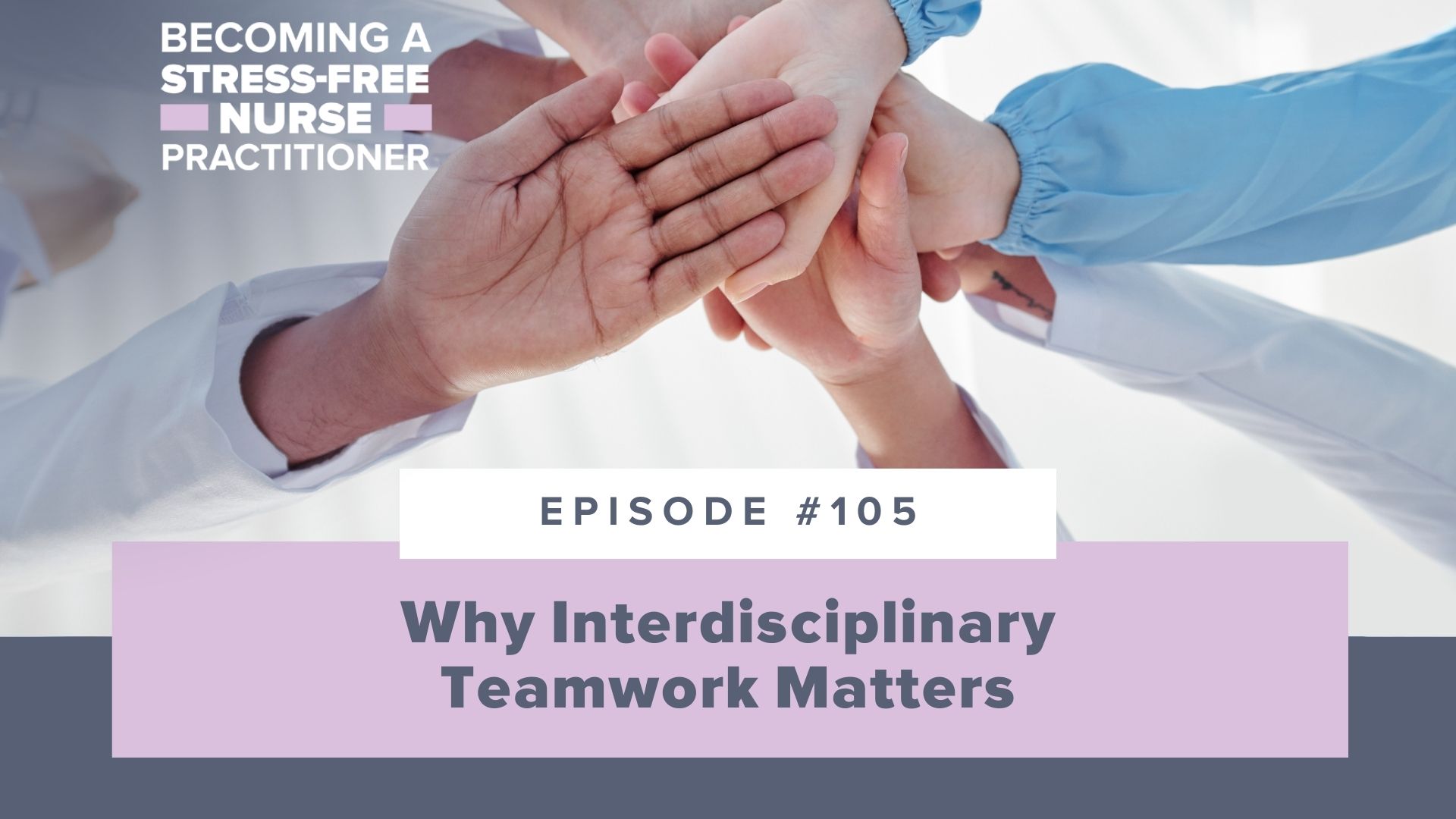Ep #105: Why Interdisciplinary Teamwork Matters
- by Sarah Michelle
- Jan 24, 2024
- Podcasts

We talk a lot about the role of a Nurse Practitioner, but the truth is, we never truly work alone in healthcare. No matter what kind of Nurse Practitioner you are, you likely work alongside hospitalists, nurses, case managers, social workers, specialists, and ancillary staff.
The unifying thread between all of you is to create a positive patient experience and to provide excellent care. You are always part of the patient care team as a Nurse Practitioner, so the question then becomes: How can we, as real-deal Nurse Practitioners, contribute to the ever-evolving dynamic of interdisciplinary care and teamwork?
Join me this week to discover what interdisciplinary even means, why acknowledging teamwork matters, even if you can work independently, and my tips for being an effective part of an interdisciplinary team.
If you’re looking for support, no matter what phase of your nurse practitioner journey you’re currently in, I have communities available for both students and new nurse practitioners. In these communities, we work to uplift one another and grow this profession together every day. Interested? Click here if you’re a student and click here if you’re a new NP!
What You Will Discover:
- What an interdisciplinary team means.
- How, as Nurse Practitioners, we never truly work alone.
- Why working as part of a team matters.
- How to act as an effective part of an interdisciplinary team.
Featured on the Show
Full Episode Transcript:

Welcome to Becoming a Stress-Free Nurse Practitioner, a show for new NPs and students that want to pass their board exam the first time and make that transition from RN to NP as seamless as possible. I’m your host Sarah Michelle. Now, let’s dive into today’s episode.
Hey friends, Sarah Michelle here. Long time no see since I have done a solo episode without Anna. But this brief little episode is all about interdisciplinary teams. Now naturally, at SMNP Reviews we talk a lot about the role of the nurse practitioner, but the truth is we never really work alone in healthcare. We are always part of that patient care team and what we’re trying to do is ensure and really drive those patients towards positive outcomes.
And so the question here becomes how can we, as new nurse practitioners, make sure that we are acting as part of that patient care team? And so in this quick episode we are going to be talking about things like what does interdisciplinary even mean and why is it important to talk about in the first place? Like why are we going to spend an entire episode on this podcast talking about interdisciplinary teams?
And then we’re going to end by talking about some tips about how you can be a part of an interdisciplinary team and really improve those outcomes for your patients because that’s ultimately always going to be the goal, right?
And so that term, interdisciplinary, may or maybe it doesn’t sound that familiar, and that’s okay. But breaking it down, it basically means working together amongst different disciplines, typically towards a common goal. Specifically in healthcare it means that we use a team-based approach to promote those better patient outcomes.
And so thinking about some examples of interdisciplinary teams, a common place that we are all likely familiar with, no matter what type of nurse practitioner you are, is in a hospital setting.
You’ve got the hospitalist or intensivist who is overseeing that plan of care, but then amongst them you’ve got the nurses caring for the patient at the bedside, case managers and social workers working on that discharge plan, and then all of the specialists too, like cardiology or pulmonology, and they’re writing orders as well.
And of course we can’t forget about that other ancillary staff who work with you to take care of patients as well. And the unifying thread among all of them is to create that positive patient experience and provide really awesome, excellent care.
And to take the term interdisciplinary to the primary care setting, sometimes primary care providers, including nurse practitioners, are referred to as gatekeepers. So we help to oversee the plan of care and general management of patient health, but we are working alongside specialists and community resources to make sure that patients really get the care that they need.
And so that takes us into talking about why working as a part of a team is so important. First and foremost, as we’ve said a couple of times now, it really does result in better patient outcomes overall. The combined efforts among healthcare professionals leads to comprehensive care that is well organized and coordinated.
As NPs we need to make sure that we are keeping those lines of communication open amongst all the members of our healthcare team. And so along with better diagnoses and treatment plans and because of that hand-off communication and general flow of information between healthcare professionals, it can really cut down on medical errors.
As we care for an aging population with an increase in complexity of care, interdisciplinary teamwork promotes continuity of care and really decreases that fragmentation of care when we’re dealing with multiple specialties.
Another great thing is that it promotes better efficiency, leading to those reduced healthcare costs. And with the cost of medical care these days, we should all be conscientious of those healthcare costs. And those reasons are probably why interdisciplinary care is supported by just about every professional healthcare organization out there, from national and international nursing organizations to organizations for physicians, physical therapists, pharmacists, and even more than that.
And in addition to the patient benefits of interdisciplinary care, it also improves job satisfaction and increases retention among healthcare professionals. Imagine being a part of a team that supports one another and works to achieve that common goal.
Interdisciplinary teamwork reduces burnout, which we know is a huge, huge topic these days. And whatever job that you find as a nurse practitioner, make sure that they support interdisciplinary care and make communication among members of the healthcare team easy and streamlined.
So now that we know what interdisciplinary means and have a better grasp and really its importance in healthcare, we need to know how we as nurse practitioners contribute to that teamwork. The good news is that there are so many different ways we can go about it.
As primary care NPs, we might be those providers that are making referrals to different specialists and community resources, and so we need to stay on top of that organization of care. Or you might be working in a specialty clinic, so your role will be to make sure to loop back around with that primary care provider to ensure that seamless level of care.
And lastly, another part of knowing your role is understanding your scope of practice. What can you handle on your own? What does need a referral? Who is in your network of providers that you can refer to or even reach out to with questions? Just because you might be able to work independently or close to it, especially depending on where you’re licensed, doesn’t mean that we should only work independently.
You should ideally be making connections with different providers that you can reach out to, even to just answer questions or bounce ideas off of, because as we know, medicine is ever-changing. Things are switching up every single day it feels like, and so having those sounding boards to talk to will be crucial.
And connected to knowing your role is to make sure that we ourselves are good communicators. How can we explain our role to others? How can you communicate within your medical record system?
Most electronic medical records have a way to send messages between providers and professionals within that same organization, but for people outside of your system, how can you make sure that you communicate with them? For example, most referrals require an address, telephone, fax number of the person placing the referral so that follow-up notes can be sent.
Another great communication technique is to have regular team meetings with the people in your office. That way everyone in your office can be up-to-date on patient care and needs. And in that communication, we need to be inclusive and welcoming. This means respecting everyone’s roles and valuing the expertise that everyone brings to the table because everyone brings something a little bit different. And then making sure that you are using active listening techniques to show your commitment to good communication.
If you work in a specialty, I would also recommend limiting the amount of jargon that you use in your notes. Each specialty typically has their own abbreviations, which is okay for quick notes between providers of that same specialty. But when formally communicating with other team members, use language that’s easy to understand in those general medical terms.
I think the only other thing that I want to add to this quick episode is to make sure that we always, always, always keep the patient as the focus. And I know that sounds silly and like a no-brainer, and of course we’re doing that, but if you are managing multiple referrals or keeping track of labs and other diagnoses coming back, it can get overwhelming.
Is the patient getting the care they need? Or are they being shuffled between provider to provider? These are things that you want to be aware of and thinking about. If you have any questions or concerns, do not hesitate to call the patient in for a follow-up visit to discuss things and make sure that they are absolutely getting the care that they need.
And so in this episode we went over the main highlights of interdisciplinary teamwork in healthcare and how you, as a real deal nurse practitioner now, can contribute to that evolving dynamic. And remember too, we are always a part of the patient care team to help ensure those positive health outcomes.
We do not have to work in silos in healthcare. And to be a part of a true team, please be sure to be welcoming, be inclusive, use those great communication skills, and keep the patient at the center and the heart of your care. And if you can contribute to an interdisciplinary team, you’re sure that you will see the benefits as well.
Thank you for tuning in to this quick episode with me this week. I hope you enjoyed this topic. I’m excited to get back to having back-and-forth conversations with Anna here very soon. And so be sure to follow the podcast and, of course, SMNP Reviews is on YouTube and Facebook as well. Talk to you next time.
As an extra bonus, friends, if you’re looking for support no matter what phase of your nurse practitioner journey you’re currently in, I have communities available for both students and new nurse practitioners. In these communities, we work to uplift one another and grow this profession together every single day. Links to join will be included for you in the show notes.
Thanks for listening to Becoming a Stress-Free Nurse Practitioner. If you want more information about the different types of support we offer to students and new NPs, visit npreviews.com/resources. See you next week.
Enjoy the Show?
- Don’t miss an episode: follow the podcast on Spotify, Apple Podcasts, Google Podcasts, or RSS.
Related Posts
Search the Blog
Join our Facebook Group!
Get FREE support and encouragement from thousands of FNP/AGPCNP students and our NP Support team.
Learn More3 Study Hacks to Conquer Your NP Exam!
Download these tips that have helped thousands of students pass their NP board exams.
Download NowInstitutional Partnerships
Are you a faculty member and would like to bring Sarah Michelle’s resources to your school? Email us at nursinggroups@blueprintprep.com for special institutional pricing or click on the link below to learn more.
Learn MoreGroup Discounts
Are you a student and have 10 or more classmates interested in purchasing Sarah Michelle’s courses? Email us at nursinggroups@blueprintprep.com for special pricing.



